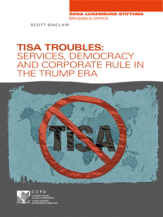 The main issues at stake in the TiSA negotiations, as is true in most so-called trade agreements, are not principally trade-related at all. TiSA is about curtailing society’s ability to democratically regulate and control the activities of multinational corporations engaged in the delivery of servicesa – and to provide essential services to their citizens through the appropriate mix of public, not-for-profit and private services that they themselves decide
The main issues at stake in the TiSA negotiations, as is true in most so-called trade agreements, are not principally trade-related at all. TiSA is about curtailing society’s ability to democratically regulate and control the activities of multinational corporations engaged in the delivery of servicesa – and to provide essential services to their citizens through the appropriate mix of public, not-for-profit and private services that they themselves decide
By Scott Sinclair
In late 2016, trade ambassadors from 23 WTO member governments gathered in Geneva in a last-ditch effort to wrap up negotiations on an ambitious but little known international trade agreement. In the weeks and months leading up to the meeting, chief negotiators and other officials had been working feverishly to finalise the Trade in Services Agreement (TiSA) before a new US administration took office in January 2017.
Despite the intensive preparatory work, the ambassadors were unable to strike an agreement. Afterwards, officials gamely stressed that a deal was within sight. But a planned December meeting of trade ministers to finalise and sign TiSA was cancelled, much to the disappointment of global corporate lobby groups that have been pressing for years to get a new services deal in place.
TiSA talks have been officially underway since March 2013, and this is not the first time deadlines have slipped. The difficulties encountered in reaching agreement – even after over 20 full negotiating rounds and dozens of technical sessions – hint at the sensitivity of the wide range of issues on the table, including data privacy, digital trade, financial sector regulation and whether to automatically cover future services that have not even been conceived yet. The delays underscore the deeper issues of democratic authority and regulatory autonomy at stake in these secretive talks.
The purpose of this paper is to provide a fuller understanding of these underlying issues. It will argue that, under the guise of expanding the international trade in services, TiSA is in fact aimed at freeing corporations providing transnational services from what they view as burdensome and needlessly differing national and local regulations. The agreement is also designed to pry open public services to commercial involvement. Failing that, public services and public enterprises would be confined, as much as possible, within their current boundaries. As such, this proposed treaty, while nominally about international trade in commercial services, cuts to the heart of the democratic regulation and decisionmaking affecting all services.
Two key points on which both TiSA proponents and critics agree are that services are incredibly broad and diverse and that they play a vital role in a modern economy. Services are associated with virtually every human need from birth to death and nearly everything citizens elect governments to do. A service can be defined as a product of human activity, other than a tangible commodity, that is aimed at satisfying a human need. There are many types of services, ranging from private banking to public transport, electricity transmission to education, and childcare to water purification. Typically, services account for at least 60 to 70 % of the share of economic activity in a modern economy.
Countless people deliver services that are vital to our daily lives and many of our jobs are directly tied to the provision of services to others. More broadly, how we choose to organise the delivery of vital services, including how to make them affordable and universally accessible, is a fundamental aspect of how we govern ourselves. Unlike the international trade in goods, there are no tariffs or other at-the-border restrictions on trade in services. In fact, the principal barriers to international trade in services which TiSA targets are national, state and local government regulations. As with any other commercial activity, services must be regulated to protect consumers, the environment and the public interest. Deregulation makes it easier for corporate service providers, but it can increase the risk of fraud, exploitation and, in the case of financial services, systemic crisis.
Moreover, many essential services such as electricity, water, public transport, education or health care are best provided publicly or on a not-for-profit basis. Public services are a hallmark of an advanced society. Opening them to profit-making in order to boost international trade in services will reduce social well-being. It also carries a strong potential to decrease efficiency, since private, for-profit providers typically have higher financing costs than public entities and demand higher returns for their shareholders.
In these and many other ways, TiSA threatens democratic decision-making. The proposed agreement is mainly about restricting the regulation of an extremely broad range of privately delivered services, from local transport to international finance. It also interferes with how societies define the constantly shifting boundaries between private for-profit and public not-for-profit services. The governments and negotiators involved in TiSA only superficially acknowledge these concerns, relying on bland assurances about the right to regulate and protection for public services. But such assurances are empty because, as will be shown, they are not adequately reflected in the legal terms of the agreement.
The main issues at stake in the TiSA negotiations, as is true in most so-called trade agreements, are not principally trade-related at all. Fundamentally, TiSA is about curtailing society’s ability to do two things: first, to democratically regulate and control the activities of multinational corporations engaged in the delivery of services; and second, to provide essential services to their citizens through the appropriate mix of public, not-for-profit and private services that they themselves decide. The goal of boosting international trade in services is simply a convenient ideological cloak behind which corporate lobbyists can quietly target unwanted regulations, develop business-friendly regulatory templates and increase pressure to commercialise public and essential services.
TiSA Troubles: Services, Democracy and Corporate Rule in the Trump Era (pdf)
Brussels, July 2017




